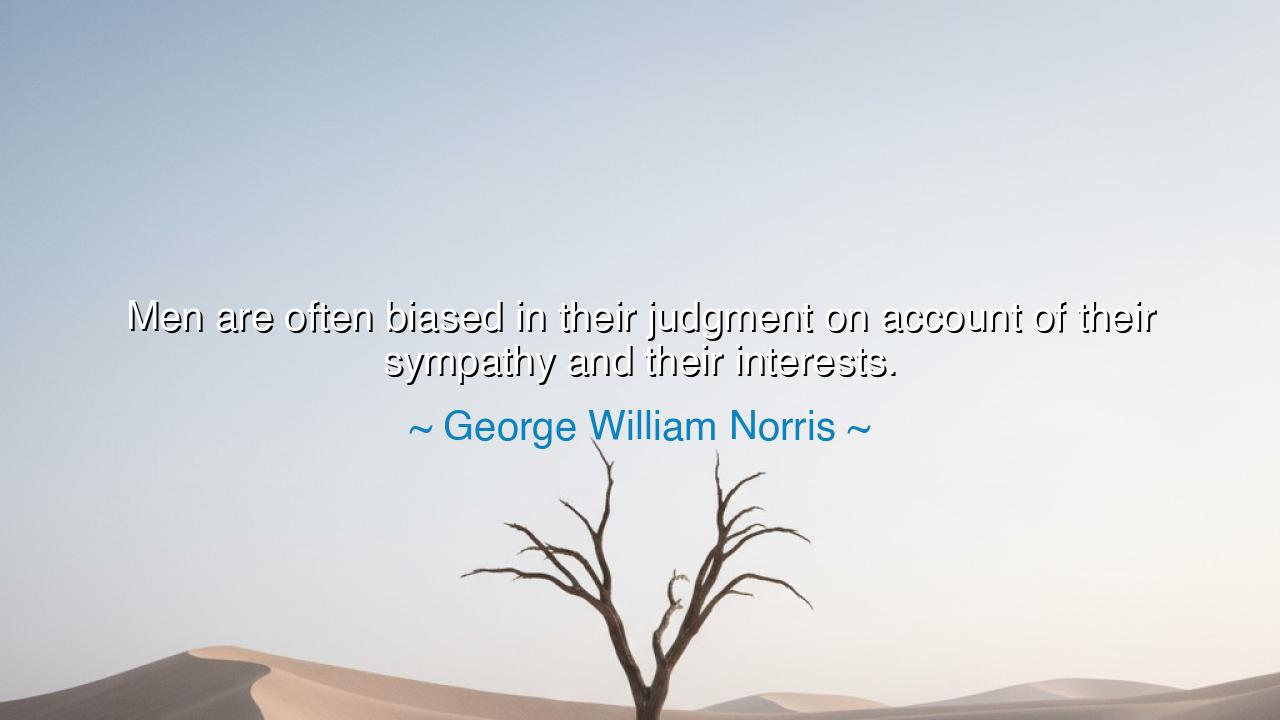
Men are often biased in their judgment on account of their
Men are often biased in their judgment on account of their sympathy and their interests.






The words of George William Norris, “Men are often biased in their judgment on account of their sympathy and their interests,” are a mirror held up to the frailty of the human mind. Beneath their calm phrasing lies a truth that pierces through every age: that justice is not easily attained, for the heart of man is clouded by both emotion and desire. Norris, a man of politics and principle, spoke from the furnace of public life, where decisions shape nations and integrity is constantly tested. His wisdom reveals that bias—born of sympathy for those we favor, or of interest in what we desire—can twist the straight line of truth into a crooked path. And unless we master ourselves, we cannot hope to judge rightly the world around us.
In these few words, Norris exposes the two great distortions that threaten all human judgment: sympathy and interest. Sympathy, though noble in its essence, can blind the eye to justice when it becomes partial. We forgive too easily those we love, and condemn too quickly those we despise. Our emotions, meant to make us human, often make us unfair. Interest, the second distortion, is even more insidious. It whispers that truth may bend for profit, that justice may be postponed for advantage, that principle may yield to power. Together, these forces make men forget that the true judge must be cold as iron and pure as light—feeling with the heart, but deciding with the soul.
The ancients wrestled deeply with this dilemma. The philosopher Plato, in his Republic, warned that the rulers of a just state must be trained to master their desires, for only those who have conquered themselves can rule others fairly. He envisioned the philosopher-king as one who loves truth more than comfort, wisdom more than gain. Similarly, Confucius taught that the noble man acts not from emotion or advantage, but from righteousness alone. Norris’s words stand within this long lineage of moral wisdom: they remind us that the battle for justice begins within the human heart, long before it reaches the courtroom, the council hall, or the battlefield.
History offers countless proofs of this truth. Consider the tragic story of Marcus Brutus, the Roman who loved both Caesar and the Republic. His sympathy for his friend warred with his duty to Rome, and in that conflict, his judgment faltered. He sought to be both loyal and just, yet his divided heart led to ruin. Sympathy clouded his vision, interest in honor drove his hand, and what he believed was justice became betrayal. So it is with all men who fail to recognize that truth cannot serve two masters. Where emotion and self-interest contend for rule, wisdom falls silent.
Yet Norris does not condemn sympathy or interest as evils in themselves. He understood, as all wise souls do, that they are part of the human condition. The danger lies not in feeling, but in allowing feeling to rule. Compassion is the root of mercy, and interest, when rightly ordered, drives progress and innovation. But when these forces are unchecked—when the heart overwhelms reason, or ambition outweighs conscience—judgment becomes corruption. The task, therefore, is not to kill emotion, but to discipline it, to keep the flame of feeling under the control of the spirit.
The greatest leaders of history have known this balance. Abraham Lincoln, for instance, was a man of deep sympathy and profound moral vision. Yet when faced with the agony of civil war, he did not allow his compassion for one side or his personal interest in peace to obscure the greater justice of preserving the Union and ending slavery. His sorrow was deep, but his resolve was deeper. In him we see what Norris meant: that the just man must temper his heart with principle, and his will with truth. Such men are rare, but their influence endures beyond their years, because they act from purity of judgment, not from the bias of desire.
So let this teaching be passed down: guard your judgment as you would guard your soul. Before you decide what is right, examine what within you wishes it to be so. Ask whether your sympathies cloud your reason, whether your interests bend your fairness. Seek always the middle path, where compassion and wisdom walk hand in hand. For as George William Norris reminds us, the greatest danger to justice lies not in ignorance, but in the hidden bias of the heart. To conquer that bias is to conquer oneself—and in that conquest, the world moves one step closer to truth.






AAdministratorAdministrator
Welcome, honored guests. Please leave a comment, we will respond soon